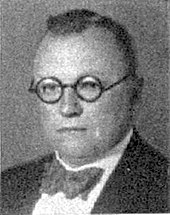Heinrich von Sybel (politician)
Heinrich Ernst von Sybel (born March 28, 1885 in Gummersbach , † March 22, 1969 in Schweinfurt ) was a German manor owner ( House Isenburg near Cologne ) and a politician (CNBL, NSDAP).
Life
His parents were the district administrator Fritz von Sybel (1844-1927) and his wife Bertha Rolffs (1856-1943).
Heinrich von Sybel attended elementary school . Easter 1903 he passed the Abitur at the Prinz-Heinrich-Gymnasium in Schöneberg . He then became a flag boy in the Magdeburg Hussar Regiment No. 10 in Stendal. As a result he attended the War Academy in Berlin .
During the First World War , Sybel took part in both the front and the general staff of the 76th Reserve Division . After the end of the war in 1919 he headed the German military mission at the American occupation authorities in Koblenz. Retired from active service as a major in 1920 , he studied economics in Hanover and Berlin . Then he managed his estate near Cologne.
Since May 1922 Sybel was active in the Reichslandbund as head of the tax policy department. In 1926 he became the federal economic policy director. At the end of 1926 Sybel became a member of the Provisional Reich Economic Council , of which he was a member until it was dissolved.
Sybel was initially politically active in the Christian National Peasant and Rural People's Party (CNBL). In May 1928 , Sybel entered the Reichstag on his party's proposal for a Reich election . In the election of September 1930 he successfully ran for the German country people (CNBL) for election. In December 1931, von Sybel switched to the Reichstag faction of the National Socialist German Workers' Party (NSDAP) as an intern . For the NSDAP, which he joined on October 1, 1932, von Sybel was a member of the German parliament from 1932 to 1945. From the Reichstag election in July 1932 to the Reichstag election in 1938 , he represented constituency 1 (East Prussia) in parliament. From April 1938 to May 1945 he represented constituency 13 (Schleswig-Holstein). After the passing of the Enabling Act in March 1933, which was also passed with Sybel's vote, Sybel's role in parliament was limited to that of an extras and acclamateur.
Since 1929 Sybel came out through his public appearance against the Young Plan . In late 1932 and early 1933 Sybel fought against the Schleicher cabinet . There were also various essays on economic policy issues, especially on agriculture.
As director of the Reichslandbund, Sybel was retired in June 1934. On February 4, 1939, he was arrested by the Gestapo for allegedly anti-regime statements ; released on March 11, 1939 from Moabit prison. Proceedings initiated against Sybel for an offense against the Treachery Act were dropped in late March 1939. According to Ulrich von Hassell 's diary , Sybel was arrested “ after denouncing a personal enemy for statements hostile to the regime”; After his release from prison, Sybel had “just like someone who had returned from vacation” happily breakfasted with the Prussian finance minister, Johannes Popitz .
At the beginning of the Second World War , Sybel was called up as a lieutenant colonel in the Wehrmacht on September 1, 1939 and was subsequently active in an armaments inspection and in general staff positions.
After the liberation , Sybel was classified as "exonerated" in the denazification of the Bad Kissingen court in May 1948 . After an initially contrary decision, in May 1951 the Bavarian State Compensation Office awarded him indemnity. Sybel moved from Bayreuth to Bad Kissingen in 1946 , where he lived until his death.
literature
- Joachim Lilla , Martin Döring, Andreas Schulz: extras in uniform: the members of the Reichstag 1933–1945. A biographical manual. Including the Volkish and National Socialist members of the Reichstag from May 1924 . Droste, Düsseldorf 2004, ISBN 3-7700-5254-4 , p. 660 .
Web links
- Heinrich von Sybel in the database of members of the Reichstag
Individual evidence
- ^ Joachim Lilla (editor): extras in uniform. The members of the Reichstag 1933–1945. Droste, Düsseldorf, 2004, ISBN 3-7700-5254-4 , p. 660.
- ^ Ulrich von Hassell: The Hassell Diaries 1938-1944. Notes from the other Germany. Siedler, Berlin 1988, ISBN 3-88680-017-2 , pp. 83, 87; quoted by: Martin Schumacher (Ed.): Md R. The Reichstag members of the Weimar Republic in the time of National Socialism. Political persecution, emigration and expatriation 1933-1945. Droste, Düsseldorf 1991, ISBN 3-7700-5162-9 , p. 574.
- ↑ Schumacher, Md R. , p. 573.
| personal data | |
|---|---|
| SURNAME | Sybel, Heinrich von |
| ALTERNATIVE NAMES | Sybel, Heinrich Ernst von |
| BRIEF DESCRIPTION | German farmer and politician (NSDAP, CNBL), MdR |
| DATE OF BIRTH | March 28, 1885 |
| PLACE OF BIRTH | Gummersbach |
| DATE OF DEATH | March 22, 1969 |
| Place of death | Schweinfurt |
